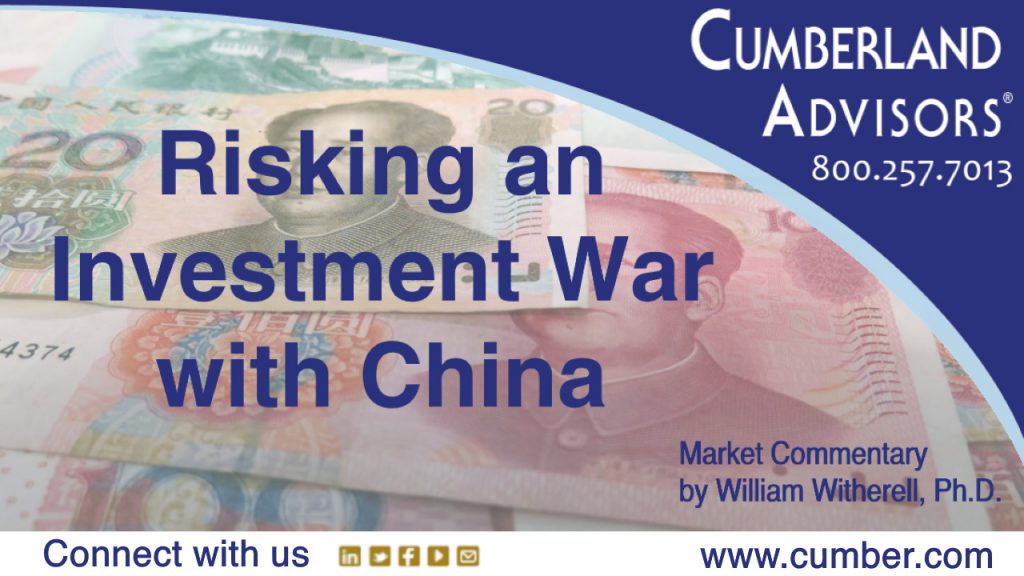Not having learned the costly lessons of a US-China trade war, the US government has now taken action that risks triggering an investment war with China that could have serious negative effects on the economies of both countries at a time when each will be seeking to recover from the heavy impacts of the COVID-19 crisis.

The timing could not be worse. The main US federal government pension fund, the Thrift Savings Plan (TSP), which has $594bn in assets for 5.9 million government employees, is managed by the Federal Retirement Thrift Investment Board (FRTIB). White House pressure, citing how China has responded to COVID-19 and arguing that Chinese companies present a national security risk to the US, caused the FRTIB to reverse a plan for the TSP to include Chinese stocks in its international portfolio. Beijing has responded sharply and noted that the action will hurt US investors. The US action coincided with a ramping up of wide-ranging criticism of China by President Trump and some senators, adding fuel to what The Economist magazine aptly calls the developing US-China “Scold War.”
The FRTIB stated that the move to invest in Chinese stocks has been “deferred,” in part because Trump had in the previous week nominated three new board members. That certainly suggests the future investment policy of the board with respect to China will reflect the president’s views. There are several reasons to be concerned about this action.
First, as the FTRIB argued in November, not to invest in a global index of stocks that includes Chinese stocks would disadvantage the 5.5 million federal employees that invest in the pension fund. The evidence supporting that statement is strong. The board had been planning to switch their international portfolio from the MSCI EAFE Index of investible developed-market securities based in Europe, Australia, and the Far East to the MSCI ACWI ex-USA Index of international stocks, which covers investible securities of all emerging and developed markets, excluding the US. Both indexes are market capital-weighted and exclude small caps. Chinese companies account for some 11.33% of the stocks in the iShares ACWX ETF that tracks the MSCI ACWI ex-USA Index. China’s stocks are second only to Japan’s 17.28% share. In recent years Chinese stocks have outperformed most other international markets. Over the past three years, including the current year to date, the MSCI China Index gained 7.58% compared with the MSCI EAFE Index’s loss of 1.93%. The MSCI ACWI ex-USA hasn’t done much better, a loss of 1.57% as China’s strong performance has been offset by weaker performance in other markets.
A greater concern is that this move and the rhetoric surrounding it could lead to a tit-for-tat escalation of restrictions on investment flows between the world’s two largest economies, a development that would do long-term damage to both economies at a time when the global economy is in the deepest recession in memory. We already have the president saying that he is “looking very strongly at” the stocks of Chinese firms listed in the US and at whether Chinese companies should be allowed to list if they did not follow US accounting rules. He did note there is a downside to such a move. He also is increasing his rhetoric on trade, threatening to counter the progress that has been made in that area. He went so far as to say “We could cut off the whole relationship”. While some of this rhetoric can be discounted as political bluster aimed at the November elections, serious harm can result. Clearly the risk of retaliation from China that impacts investment and capital markets is great. Washington should not forget that China holds over $1 trillion of US Treasury bonds.
I will close with a little history. The current global integration of capital markets has played an important role in the post-World War II recovery and growth of the global economy and economic development. The reduction and eventual elimination of most restrictions on capital flows was encouraged and overseen by the OECD and the IMF, recognizing that financial integration needs to be matched with sound domestic policies. The OECD’s Capital Movements Code, the sole multilateral agreement among states addressing capital flow policies, has served for over 60 years. For 26 of those years I directed the OECD’s peer-exchange and peer-review mechanisms with respect to the liberalization of capital flows. The Code was revised and adopted in 2019. The updates included increased transparency and efficiency along with closer ties to the IMF and the G20. The objectives of removing barriers to the movement of capital while tackling economic and financial instability remain valid for the international financial architecture. We take threats to that architecture seriously.
The ETF mentioned in this commentary, ACWX, is currently held in Cumberland Advisors International and Global portfolios. It is not held by the author.
Bill Witherell, Ph.D.
Chief Global Economist & Portfolio Manager
Email | Bio
____________________________________________________________________
Sources: Financial Times, New York Times, CNBC, http://OECD.org, BBH Currency Strategy
Links to other websites or electronic media controlled or offered by Third-Parties (non-affiliates of Cumberland Advisors) are provided only as a reference and courtesy to our users. Cumberland Advisors has no control over such websites, does not recommend or endorse any opinions, ideas, products, information, or content of such sites, and makes no warranties as to the accuracy, completeness, reliability or suitability of their content. Cumberland Advisors hereby disclaims liability for any information, materials, products or services posted or offered at any of the Third-Party websites. The Third-Party may have a privacy and/or security policy different from that of Cumberland Advisors. Therefore, please refer to the specific privacy and security policies of the Third-Party when accessing their websites.
Sign up for our FREE Cumberland Market Commentaries
Cumberland Advisors Market Commentaries offer insights and analysis on upcoming, important economic issues that potentially impact global financial markets. Our team shares their thinking on global economic developments, market news and other factors that often influence investment opportunities and strategies.

